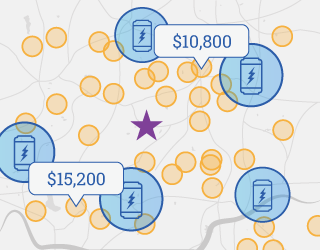You are probably already familiar with a range of batteries–from the AAAs in your TV remote to the larger battery under the hood of your car that you hopefully rarely think about. Just as different types of batteries are most useful for different types of applications in your home, there is one type of battery that is ideal for being paired with solar energy systems: deep cycle batteries.
Energy storage terminology
At their core, batteries charge and discharge electricity. A great analogy for batteries is a water pitcher. When the pitcher is being filled with water, it is charging. When the pitcher is pouring out the water, it is discharging. In energy storage parlance, this process of a single charge (i.e., filling the pitcher) followed by a single discharge (i.e., emptying the pitcher) is called a “cycle”.
Two other key terms to understand before diving into deep cycle batteries are depth-of-discharge and the state-of-charge. Depth-of-discharge is a metric for how much of the battery’s electricity you’ve used, while the state-of-charge is a metric for the amount of electricity remains stored in the battery. Using the same water pitcher analogy, if you were to pour out only three-quarters of the water pitcher, the depth-of-discharge would be 75 percent while the state-of-charge would be 25 percent.
There are a lot of terms and jargon associated with batteries. To learn more about relevant terminology, check out our energy storage glossary.
Deep cycle batteries vs. starting batteries
There are two main distinctions between types of batteries, each appropriately named for the situations when they are most useful: starting batteries and deep cycle batteries. Starting batteries are used for turning on appliances, such as lighting or a car’s ignition. These types of batteries provide a very large amount of power over a very short period of time to get an appliance (or car) up and running.
Deep cycle batteries, on the other hand, produce a smaller amount of energy but are able to do so for a very long period of time. The nomenclature of deep cycle batteries comes from the fact that they are designed to be discharged as fully as possible each time they are used, a “deep-cycle” of the battery. Whereas discharging a starting battery fully can decrease the lifetime of the battery, discharging a deep-cycle battery fully is exactly the battery’s intended purpose.
Best applications for deep cycle batteries
The nature of deep cycle batteries is to provide a consistent source of energy over a prolonged period and to be frequently fully charged and discharged. As a result, that makes deep cycle batteries ideal for pairing with renewable energy resources and home energy storage applications. In particular, deep cycle batteries are a perfect complement for solar energy. While the sun is shining during the day, deep cycle batteries can store generation from your solar panels. When the sun goes down, you can use the electricity stored in the battery to power devices in your home. And then, when the sun comes up the next morning, your partially- or fully-emptied battery will be ready be charged anew by the electricity generated by your solar panels.
As opposed to starting batteries, which are meant to never be discharged fully and are only intended to provide an initial kick-start of power for other systems, deep cycle batteries are ideal for home energy storage purposes. For the most part, home energy storage systems must be capable of providing a steady amount of electricity over a period of several hours – exactly the service provided by deep cycle batteries.
Choosing the right deep cycle solar battery
If you are considering a solar plus storage system or already have solar and are looking to add energy storage, a deep cycle solar battery is the way to go. In fact, all of the major brands offering solar batteries on the market are currently offering deep cycle solar batteries. Depending upon your electricity consumption habits, there are a number of different batteries that can meet your needs. To get started, you can register for the EnergySage Marketplace to receive free solar (and storage!) quotes from local solar companies.






